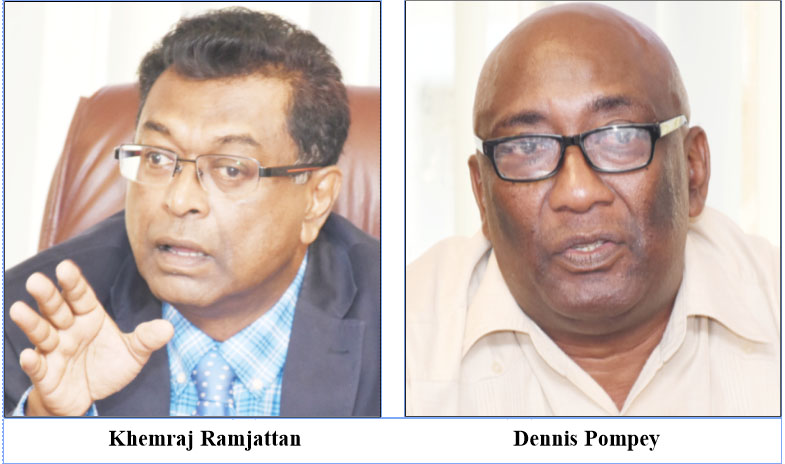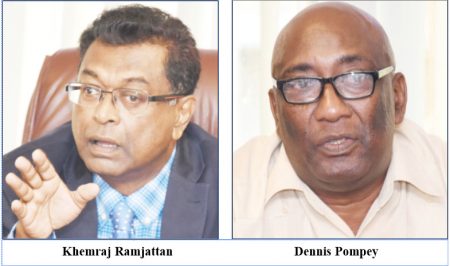Amidst growing concern about the number of foreign nationals entering Guyana illegally through unmanned parts of the country’s borders, Public Security Minister Khemraj Ramjattan on Monday said that efforts are afoot to have Community Policing Groups (CPGs) set up in border villages to assist the police and the army.
“Absolutely and we want to help …the police and the army and there have been calls from some members, especially those that own shops, that have indicated to me that they would like to set up some CPG groups for purposes of also enhancing, at the local level, their security and having groups that are going to do the patrols and the surveillance,” Ramjattan said, when asked whether there is a strategic plan to have CPGs beefed up in the border areas as part of the government’s frontline community policy.
Ramjattan at the time was hosting a press conference in honour of the 42nd Anniversary celebration for Community Policing Organisations of Guyana during which CPG Coordi-nator Dennis Pompey used the opportunity to provide an overview of the work done in 2017 and what can be expected for 2018.
Regional officials and particularly those from Region One have expressed concern about the influx of hundreds of Venezuelans, who they say are putting a strain on the healthcare system and are also committing petty crimes. There have also been reports coming from regions Nine and Seven of illegal entries but on a much smaller scale.
Ramjattan, responding to questions about role of community police in securing border locations, said that some of the persons who have expressed a willingness to form groups would like to have police powers, given the shortage of ranks in those areas where villages are scattered.
The minister expressed some amount of certainty that the CPGs will have the capacity to gather and process information to assist with the security of those geographic areas that are close to Venezuela. While pointing out that one challenge would be that the residents may not be able to supply standard intelligence, he said that they must be able to report sightings of strangers.
“If they see strangers and they see Venezuelans coming in and doing a couple of things, we would like them to telephone us at the headquarters here at the Ministry and say …that also helps because the police are doing it. Army people, who are doing patrols there, are also doing it,” he said.
As soon as possible
Pompey informed that efforts will be made to establish groups in regions Nine and One, where border towns are located. While acknowledging that efforts have not been made to visit Region One, in particular, he said it is necessary that this be done as soon as possible.
He stressed that community policing in the interior has been rewarding as members have assisted the police in the detection of illegal aircraft. He said that aside from persons entering Guyana from Venezuela, persons from African nations and Cuba are entering through Brazil. “All those activities are being monitored by some of the groups in the Lethem area,” he explained.
Pompey informed that one of the major challenges is that members often have to use their own finances to execute patrol duties. “It will cost about $200,000 per year to utilise a vehicle for patrols,” he said, while noting that joining a CPG is voluntary.
Because of this challenge, he has found that some members do not stick around for long. “They come into it feeling that it is just something you can run in and run out. There are some difficulties in maintaining membership sometimes,” he told reporters.
Like with the illegal aircraft discoveries, he said that CPG members have been instrumental in the recent dismantling of a major carjacking ring, which led to a number of persons being charged. “Community police gave information and led the way so that the persons could have been apprehended,” he pointed out, while adding that over the years community police were instrumental in the apprehension of wanted persons.
He said that CPGs have arrested in excess of 50 persons for serious offences last year.
Meanwhile, Ramjattan expressed satisfaction with the work of CPGs but said more can be done. He said that more persons have to become involved and noted that he has found that more educated persons, who understand social issues, such as domestic violence and suicide prevention, and also have the finances, are not coming forward.
He said in Georgetown, where the crime rates are the highest and where the young people are more prone to indulge in alcohol, illicit drugs and wrongdoing, he would like to see more groups formed. “I am trying my best to get the division leader to ensure that we promote some more young people joining up but we also want adult members to give the guidance,” he added.
Since he took office in 2015, over 20 new groups have been formed across the police divisions.
Ramjattan also said that he would like to see more improvement in the relationship between the police and CPGs. “It is not at its best. There are some policemen who do not like the scrutiny of the CPG groups and especially the liaison officers. They feel they are encroaching into their police territory and that is bad because if you don’t have anything to hide, you should not be afraid of being encroached upon,” he said.
Overview
Pompey noted that there are a total of 221 groups, consisting of 4,304 members.
He said that in 2017, a total of 5,765 vehicle and foot patrols were conducted across the seven police divisions.
He added that the CPGs were also involved in a number of social activities, including tree planting exercises, the cleaning of police environments and school compounds, Spelling Bee competitions, painting of pedestrian crossings, and assisting the elderly and less fortunate of their communities.
He also said CPG members benefitted from more than two dozen training sessions. Among of the topics covered were conflict resolution, basic principles of mediation, Traf-ficking in Persons, anger management, patrol duties, domestic violence and identifying forged currency.
In 2018, Pompey added, focus will be placed on continuous training in the areas of domestic and gender-based violence, suicide, trafficking in persons, drug and alcohol abuse, noise nuisance, anger management, social cohesion, leadership, secretarial duties, financial management, capacity building, divisional audits, patrol duties, care and custody of prisoners, writing up of station records, modes of arrest, statement writing, use of firearms, interpersonal skills and care and custody of assets.
The organisation began the anniversary celebration on March 1st and it will end on April 21st. The upcoming activities include a youth conference, a women’s conference and a march, among other things.
One of the key roles of CPGs is to assist the police as far as possibly in the detection and suppression of crime.







